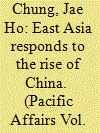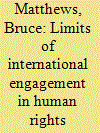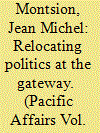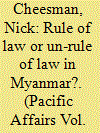|
|
|
Sort Order |
|
|
|
Items / Page
|
|
|
|
|
|
|
| Srl | Item |
| 1 |
ID:
092203


|
|
|
|
|
| Publication |
2009-2010.
|
| Summary/Abstract |
How is East Asia responding to the rising China? Pertinent literature suggests that explicit balancing or containment has been rare and engagement, if not appeasement, appears to be East Asia's modus operandi. Yet, this study argues that certain, though subtle, variations are nevertheless discernible among the regional states in their responses to China's ascent. Focusing on 15 East Asian states for the period of 2004-2007, the article first presents a bird's-eye view of East Asia's responses to the rise of China. More specifically, inter-state variations are empirically demonstrated and four principal patterns-bandwagoning, hesitant hedging, active hedging and balancing-are distilled from the key responses of these 15 nations. The article then examines the sources of these inter-state variations, and argues that they are conditioned largely by three factors: alliances with the United States, regime characteristics and territorial disputes with China. The article concludes with some observations as to East Asia's complex responses to the rise of China and their security implications for the region as a whole.
|
|
|
|
|
|
|
|
|
|
|
|
|
|
|
|
| 2 |
ID:
092197


|
|
|
|
|
| Publication |
2009-2010.
|
| Summary/Abstract |
The final three years of Sri Lanka's civil war precipitated much concern about human rights violations. Late in 2006, a Presidential Commission of Inquiry (the Justice Udalagama COI) was charged with re-examining 16 problematic cases where initial investigatory procedures had failed or were inconclusive. An unusual invitation was extended to a small body of foreign observers whose task was to confirm whether the COI was meeting accepted international standards. With this initiative, the government of Sri Lanka could also show the world community that human rights issues were being taken seriously. This essay analyzes various challenges that arose from that experience. It argues that there are critical cultural and technical limitations to international external engagement in situations where human rights are in question.
|
|
|
|
|
|
|
|
|
|
|
|
|
|
|
|
| 3 |
ID:
092200


|
|
|
|
|
| Publication |
2009-2010.
|
| Summary/Abstract |
This paper describes how small union and social movement support for plaintiffs in recent court cases has helped shape public discourse regarding excess work hours in Japan. Analysis of lawsuits involving two prominent Japanese corporations, Toyota and McDonald's Japan, brings to light seven common strategies Japanese firms use to extract uncompensated "service" overtime and links them with violations of labour laws and damage to worker health. These cases reveal the alignment and relative strength of forces in Japan's work-hour controversy, highlighting the role of civil society groups such as community unions and labour rights groups in supporting plaintiffs, and in keeping issues and their broader social consequences before the public. However, the cases also show the limits of activist pressure. Judges issued clear decisions favouring the plaintiffs, and the cases garnered considerable public sympathy. But even as the outcomes became front-page news, employers countered by attempting to re-legitimize the very overtime practices that had caused worker injury. Without the support and resources of major unions, political parties or government, campaigners for shorter work hours appear destined to struggle to transform overwork from a private problem into a public issue.
|
|
|
|
|
|
|
|
|
|
|
|
|
|
|
|
| 4 |
ID:
092202


|
|
|
|
|
| Publication |
2009-2010.
|
| Summary/Abstract |
Over the past 20 years, Singaporean state authorities have increasingly presented the city-state as a gateway between East and West. In the education sector, the Global Schoolhouse project represents a state platform for the gateway concept. It functions as a strategic business project that allows for state authorities to not only profit from the international education business but to meet national objectives, notably in terms of recruiting foreign talent to fuel local industries. As part of Singapore's move towards biculturalism, the Global Schoolhouse platform tends, however, to limit state understanding of Chinese culture in Singapore, which is becoming gradually more China-centric and homogenous. In light of Michel de Certeau's work, it is my contention that new light can be shed on Singapore's Global Schoolhouse based on how people in their everyday lives appropriate and contest this state construction of a gateway. By sharing the stories of two individuals involved in Singapore's Global Schoolhouse, it will be stressed that the significance of gateway initiatives in international matters can be better framed through the particular trajectories of people living at the gateway. In their everyday lives, people connect state initiatives to various transnational and local social processes no matter what the state objectives may be. They give particular meaning to initiatives like the Global Schoolhouse and show us how they relate to other dimensions of their lives, notably by incorporating them into transnationalized household strategies of survival.
|
|
|
|
|
|
|
|
|
|
|
|
|
|
|
|
| 5 |
ID:
092199


|
|
|
|
|
| Publication |
2009-2010.
|
| Summary/Abstract |
The rhetorical force of the rule of law is acknowledged through official discourse in Myanmar just as it is in other countries across Asia and around the world. Given that Myanmar manifestly does not conform to substantive models of the rule of law, which are associated with democratic government and individual liberties, might it conform to a minimalist one? Is there in Myanmar a thin rule of law to which the military government can lay claim, one compatible even with grave abuses of human rights? Or is there only "un-rule of law"? Beginning with some theoretical concerns, this article passes briefly through a review of law and rule-of-law rhetoric in the country's modern history before arriving at the present day. It recounts a court case arising from a recent historic event, the September 2007 antigovernment protests, to query whether or not a thin rule of law can, in Myanmar at least, be said to coexist with authoritarian rule. It concludes that it cannot. But if the army in Myanmar has succeeded in overwhelming the courts at cost of the rule of law, ironically in doing this it may also have averted a worse scenario, one in which the denial of fundamental rights for which it is well known could be even greater than at present.
|
|
|
|
|
|
|
|
|
|
|
|
|
|
|
|
|
|
|
|
|